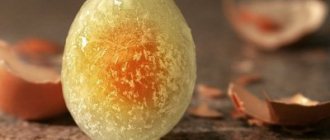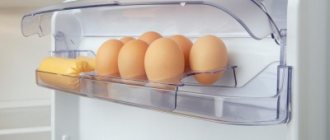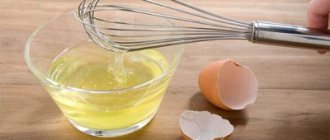Why you shouldn't wash chicken eggs before storing them in the refrigerator
The habit of washing everything before putting it in the refrigerator indicates a person’s cleanliness. Anyone who washes chicken eggs is afraid of salmonellosis. On the one hand, washing is completely justified - this way you can kill all the bacteria that are on the shell. On the other hand, by washing a chicken egg, you will destroy the protective film on its surface and significantly reduce the shelf life of the product.
We recommend reading: How long does meat last in the refrigerator?
Important: washed chicken eggs can be kept in the refrigerator for no more than 5 days.
If there is droppings on the eggs, wipe them off with a dry cloth. Eggs can be washed with soap and water immediately before consumption - this way you will protect yourself and your loved ones from pathogenic bacteria.
In addition, you need to adhere to some other simple rules:
- Carefully inspect eggs before purchasing - do not buy eggs that have even a small crack.
- After cooking, throw away the shells and wash all used kitchen utensils in soapy water.
- Eggs should be stored in a closed container in the refrigerator. This will make it impossible for the eggs to come into contact with other products that may be contaminated.
Do you wash before cooking?
Before breaking the shells to prepare omelettes, scrambled eggs or pancakes, they must be washed under warm running water, otherwise the bacteria living on the shells will get into the dish. Do I need to wash eggs before boiling? Some believe that there is no such need, since high temperatures mercilessly destroy salmonella colonies. At the same time, it won’t hurt to rinse the product once again before cooking to remove any accidentally stuck dirt. Moreover, this dirt is not always visible.
You need to wash eggs in warm water
Before immersing eggs in boiling water, it is also advisable to wash them.
It is also important to check that there are no cracks in the shell. If it is cracked, it is not recommended to eat the product.
How long can you store eggs in the refrigerator?
Having figured out whether it is possible to wash chicken eggs for storage , let's now move on to an equally important question - how and where to store eggs in the refrigerator. Many housewives store eggs on the refrigerator door. This is not the best place: the door constantly opens and closes, so the temperature in this part of the refrigerator is 4 degrees higher than on the bottom shelf. Place the eggs on the bottom shelf, as close to the back wall of your refrigeration unit as possible.
At a temperature of +4 degrees above zero, eggs can be stored for up to 5 weeks.
We recommend storing eggs with the pointy end down. At the opposite, blunt end, there is a small air gap between the white and the shell. Pathogenic bacteria can accumulate in it. And if the egg stands with the blunt end down, these bacteria will rise up and infect the white.
Boiled eggs will keep inside the refrigerator for up to 1 week. The shelf life of peeled boiled eggs is up to 2 days.
Useful tips
Any farmer can encounter dirt on the eggs that his chickens produce. In such situations, the task of the poultry farmer becomes to maintain the cleanliness of the chicken coop.
It is not hard. The main thing is to monitor the condition of the nests, drinking bowls with feeders, and bedding. Private owners often add straw to maintain cleanliness. Straws are hollow inside, which encourages mold growth. Mixing with food residues creates a favorable environment for the occurrence of infection and parasites.
Therefore, it is better to replace straw with sand. It will be easier to sift out the remains of feathers, droppings, and various debris using a sieve, and pour the clean sand back. In addition, it will help chickens get rid of annoying parasites by arranging baths to clean their feathers.
We suggest you read: How to clean a burnt stainless steel pan
A good, but not cheap option is a special bedding layer. Its properties and benefits are described in the article “Litter with bacteria for a chicken coop.”
Regular disinfection of the poultry house is mandatory. Read the article “Methods for disinfecting a chicken coop at home” for important recommendations.
It is necessary to pay attention to the health of chickens. Regular monitoring will help separate the sick from the healthy so as not to risk the quality of the eggs.
Having bought a tray of eggs in a supermarket or market, it is important not to neglect the recommendations that can protect your health and save time and nerves:
- You should not purchase large quantities from private farmers. And when purchasing in these places, it is recommended to ask the sellers for a veterinary opinion - a guarantor of product quality.
- The shell must be intact. Defects allow microbes to enter.
- Bacteria from the shell can contaminate neighboring products. Sealed trays and containers with lids will help solve this problem.
- Objects that have come into contact with the shell should be thoroughly washed with a weak solution of vinegar.
- It is necessary to approach cleanliness wisely. Eggs do not need to be soaked for 2-3 hours and then rubbed for a long time to be sure of their cleanliness.
- To prepare a tasty, safe dish, it is not necessary to wash eggs with aggressive detergents. It is enough to rinse them with hot water and immediately break the shell.
Dear readers, if you found the article useful, please rate it 5 stars. In the comments you can share your opinion about what you read, your own notes, and discuss the topic. Reposting will help spread important information.
How to Store Eggs at Room Temperature
You can store eggs without a refrigerator in any cool room. Of course, in this case, wash eggs before storing . What do we have to do? Wrap each egg in paper or newspaper and place it in the basket, pointy tip down.
Eggs should be stored in plastic, cardboard containers or a basket. Eggs can be kept in the same container in which they were purchased.
To increase the shelf life of eggs, use folk remedies:
- Rub each of them with petroleum jelly, glycerin or vegetable oil.
- Soak for a few seconds in melted paraffin.
- Spread the eggs with egg white or lard.
- Make a solution of salicylic acid - 15 g of powder per 1 liter of water. Keep the eggs in this solution for half an hour. After this procedure, the eggs should dry. You can't wipe them off.
- Soak the eggs for a few seconds in a strong solution of potassium permanganate.
- Soak the eggs in sweet syrup. The syrup should be prepared as follows: for 1 liter of water, 1 kg of sugar.
Wash before use
Dry method
If the quality of the eggs is beyond doubt, but the cleanliness leaves much to be desired, then you should familiarize yourself with tips that will help you efficiently clean them of dirt.
The dry method of cleaning shells is preferable to washing with water. To do this, you need to take a woolen cloth, a toothbrush with soft bristles or a soft washcloth. And rub the shell thoroughly without pressing hard so as not to damage it. The cleaning item can be lightly moistened with water. This will make the process easier.
Use of disinfectants
A suitable method for cleaning the shell in a special solution. You need to collect two containers of water. The first will contain a disinfection solution, the second will contain clean liquid.
It is not recommended to use soap, aggressive detergents, chlorine or lime. Of course, they wash away all germs from the surface. But at the same time, they quickly penetrate into the white and yolk, making them dangerous to human health.
Soda, vinegar or manganese solutions are suitable.
The disinfectant solution should be at least 30-40 degrees. First, the eggs are dipped in hot water with the solution for a few seconds. Use a brush, rag or washcloth to thoroughly clean any droppings, feathers or other adhered dirt. Then wash them with clean water and dry them on a paper towel.
Do not wash eggs with cold water. The internal contents are compressed, forming a vacuum environment. It draws germs and bacteria inside through the pores of the shell.
How to Preserve Eggs in Saline Solution
The answer to the question of whether it is necessary to wash homemade chicken eggs before storing them in the refrigerator is obvious: it is better not to do this. If you don’t have a refrigerator or it’s broken, you can try storing eggs in a saline solution:
- Dissolve 40 g of salt in 2 liters of water.
- Boil the solution and then cool.
- Pour all the liquid into an enamel bowl.
- Place all the eggs in a saucepan, cover with a lid and cover with something. Your task is to ensure the tightness of the container.
Using this method you can store eggs for up to 4-5 weeks.
Interesting option
It is possible to extend the shelf life of washed eggs if you freeze them. Can be raw and whole, right in the shell. Or boiled, peeled.
Raw whites and yolks are frozen separately. The protein is simply poured into a tray or bag. It indicates the quantity and freezing date. The yolks are pre-beaten. For storage, they can be poured, for example, into ice molds. For ease of further use, add salt or sugar.
The article “At what temperature does a chicken egg freeze” will help you become familiar with its shelf life in this form. And also about the nuances of proper freezing and defrosting.
How long can eggs be stored depending on their variety?
Quail eggs are not so demanding on storage temperature. They can be stored on the refrigerator door or at room temperature without any problems. The shelf life of quail products is up to one month. At lower temperatures, eggs can be stored on the bottom shelf of the refrigerator for 2 months.
Chicken eggs are completely safe to eat. But only in one case - if the owner monitors the cleanliness of the chicken coop and the health of the poultry population. It is ideal to eat eggs from domestic chickens within 5 days of laying.
You don’t need to eat eggs right away, but after 2 days. In two days, the eggs will rest, and their yolk will taste much more pleasant.
Why do they wash it immediately after purchase?
One of the reasons why many try to wash eggs as quickly as possible after purchasing is their unattractive appearance. With the remains of droppings, straw, feathers, they look unappetizing; you don’t even want to pick them up.
The second reason is the fear of contracting salmonellosis or any other infection. Chickens, when kept and fed incorrectly, become spreaders of infection. Pathogenic microflora is contained on the shell.
You need to be especially careful with domestic eggs. Their purchase is risky due to the lack of a quality certificate.
All the more dangerous is the proximity of dirty eggs to meat, dairy products, and fruits. And especially with food that is not going to be cooked.
We suggest you familiarize yourself with Cleaning cupronickel forks
In America, they found a solution to the problem of dirty shells back in the middle of the last century. Each batch of fresh eggs must be treated with antimicrobial solutions. The non-standard method led to a reduction in shelf life.
Collection
Chicken eggs are usually collected twice a day.
The first time occurs in the morning, while the birds are feeding, and the second time in the afternoon. This allows the livestock owner to reduce the risk of egg pecking and excessive shell contamination.
It is best to collect eggs with clean hands so that no microorganisms can settle in its contents ahead of time.
To reduce the risk of infection, the eggs are handled with only two fingers at the blunt and sharp end. If the egg is taken with the whole hand, the thin shell that protects the egg from microorganisms will be erased, which will increase the chance of bacterial penetration.











